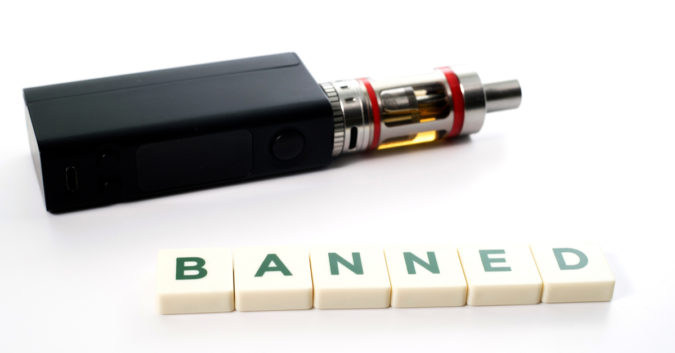Starting on Feb. 1, a partial ban on flavored e-cigarettes went into effect, but many anti-vaping advocates complain the policy is far from a “ban” and will do little to control the “epidemic” of youth vaping. Through exemptions and selective enforcement, critics say, the new rule is more “guidance” than policy.
Last September, the Trump administration announced plans to ban all flavored vaping products. At the time, the law appeared to be a strong stance against youth vaping, with the Food and Drug Administration (FDA) signaling plans to halt all retail sales of all flavored e-cigarettes. Facing pressure from conservatives and industry representatives, however, the White House later walked back on an outright ban.
The updated anti-vaping policy, announced in January 2020, enforces that no vaping flavors other than menthol and tobacco will be granted the FDA’s “premarket authorization.” However, “enforcement” should be taken with a grain of salt. As the agency itself says, the policy merely “describes how we intend to prioritize our enforcement resources.”
Watered-Down Rules
The focus on flavored e-cigarettes is an attempt to lower use among teenagers, who disproportionately vape fruit-, candy-, and mint-flavored “e-liquids.” Regulators intend to use their power to crack down specifically on vaping products that appear to be marketed to underage users.
But critics say it’s not enough. As the law stands, e-cigarette manufacturers can still submit an application for premarket authorization for any product, including flavored e-liquids, provided they can demonstrate that the product meets certain public health standards. The Campaign for Tobacco-Free Kids said in a statement:
“Rather than clear the market of flavored e-cigarettes as the Administration promised in September, the final policy is riddled with loopholes that allow thousands of flavored e-cigarette products to remain available at more than 100,000 locations across the country, including convenience stores, gas stations and vape shops.”
In an editorial, the Washington Post also argued that the new FDA policy will do little, if anything, to curb teen vape use. The newspaper criticized the policy’s selective enforcement of mere “guidelines” for e-cigarettes sales, stating its loopholes would exempt whole classes of vaping products.
“Vape shops could continue to sell e-liquids for refillable e-cigarettes in any flavor,” the Washington Post editorial board wrote. “Disposable e-cigarette manufacturers, too, would have wide latitude.”
Even the FDA seems to acknowledge its hands are tied. In an explanation of the policy, the FDA said its enforcement decisions would be performed on a “case-by-case basis," while recognizing the need to “make the best use of Agency resources.”
JUUL’s Devious Marketing
Advocacy groups like the Campaign for Tobacco-Free Kids say that e-cigarette manufacturers worked for years to market their addictive nicotine products to kids in particular. Last year, a Stanford study of tobacco industry advertising revealed a concerted effort by JUUL to attract and hook young adult users on their highly addictive products.
In the face of public backlash, some e-cigarette companies voluntarily withdrew their flavored products from the market. But short of a total ban on flavored vaping products, it appears unlikely that access to flavored e-cigarettes will be lowered much — if at all.
The products are simply too popular — and too addictive — for vaping companies to be expected to regulate themselves. Indeed, as CNN reports, several e-cigarette makers have already submitted applications for premarket review.
According to the Centers for Disease Control and Prevention (CDC), vaping among U.S. high school students soared from 1.5% in 2011 to 20.8% in 2018. A separate study by the FDA found more than 96% of teens started vaping with flavored e-cigarettes.
